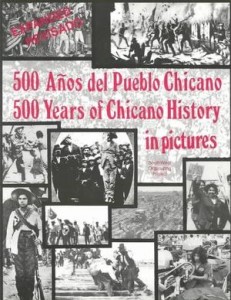The students and teachers of Tucson’s now defunct Mexican American Studies program are fighting back by bringing suit against Arizona Superintendent of Public Instruction, John Huppenthal. In an effort to protect educators and students’ rights to access comic books by and about members of ethnic communities, CBLDF has joined an amicus brief filed in the case by the Freedom to Read Foundation. The brief attacks the partisan legislation that led to end of the MAS program and the ban of several books.
Arizona Revised Statute § 15-112 is a law passed by the Arizona legislature that specifically targets Tucson’s acclaimed Mexican American Studies program. Huppenthal and other conservative politicians in the state have long argued the program fomented racial hatred, and passage of the law led to the dissolution of the program despite independent assessment that found the program did no such thing and increased student success, especially among Latino students. With the demise of MAS, TUSD also banned from classrooms seven titles by Mexican American and Native authors.
CBLDF joined FTRF’s amicus brief because any legislation that bans books based on the ethnicity of their creators or subject matter is just as likely to ban comic books for the same reason. If images of works by Frida Kahlo, Diego Rivera, or other Chicano artists can be banned (as was done with the removal of 500 Years of Chicano History in Pictures), it doesn’t seem so far fetched that works by the Hernandez Brothers would become part of Arizona’s censorship spree.
Because of Arizona Revised Statute § 15-112, Tucson students were denied access to materials and curriculum in violation of the First Amendment. The amicus brief asserts that the statute is “so broad that Arizona teachers and school districts will be forced to avoid a substantial amount of non-prohibited instruction and material to ensure compliance. Thus, the statute will chill a substantial amount of instruction that is beyond the purported purpose of the statute.”
In a press release, Barbara Jones, Executive Director for FTRF, described the impetus behind the amicus brief:
“In submitting this brief, the Freedom to Read Foundation is standing up for the right of all Arizona students to a curriculum based on educational merit, not political motivation,” said Executive Director Barbara M. Jones. “Students in the MAS program improved their educational performance. And there is no evidence that those students learned ‘racial resentment’ or discovered an interest in ‘overthrowing the U.S. government,’ as the proponents of Arizona HB 2281 contended. Providing young people with access to a wide range of ideas, including those about different cultures, helps them to think critically, become better citizens, and succeed in family and workplace life. Censoring ideas promotes ignorance and fear.”
The banned books have been provisionally allowed back into classrooms as supplemental materials, but this is no guarantee they will be used in instruction. Further, the Arizona Department of Education has stated that “It is the department’s intent to monitor how such materials are used as well as all classroom instruction and to take appropriate corrective action if the district is once again violating the law.” So, teachers who use the books can expect additional scrutiny, which can only dissuade them from including books by Latino authors in their curricula.
The amicus brief itself sums up the impact that Arizona Revised Statute § 15-112 has on free expression:
“The result is that teachers will legitimately fear, and therefore avoid using even marginally controversial materials in the classroom, no matter what their historical, literary, or educational value. Students’ exposure to important but painful parts of history, the voices of the oppressed, and the writings of controversial figures will be squeezed out of the classroom – even if these subjects are discussed in a manner that does teach students “to treat and value each other as individuals and not be taught to resent or hate other races or classes of people,” Ariz. Rev. Stat. § 15-111. That chilling effect will prevent students from receiving information and materials relating to ethnic oppression when there is no legitimate pedagogical purpose in preventing that learning.”
You can read FTRF’s press release about the brief here. The entirety of the amicus brief follows. In addition to the Freedom to Read Foundation, CBLDF joins the American Library Association, the Asian/Pacific American Librarians Association, the Black Caucus of the American Library Association, The American Booksellers Foundation for Free Expression (ABFFE), the National Association For Ethnic Studies (NAES), the National Coalition Against Censorship, the National Council of Teachers of English (NCTE), and REFORMA: the National Association to Promote Library and Information Services to Latinos and the Spanish-Speaking on the brief.
Arce v Huppenthal – Freedom to Read Amicus Brief – Filed
Get in the Spirit of Giving, and help support CBLDF’s important First Amendment work by getting personalized holiday gifts, making a donation, or becoming a member of CBLDF!
To view CBLDF’s prior coverage of the MAS ban, click on the links below:
TUSD’s Lift of Book Ban Draws Ire of Arizona Department of Education
Tucson School District Lifts Ban on Mexican American Studies Books
Embattled Mexican American Studies Program Finds Another Way
Court Upholds Law that Led to Tucson Book Ban
Move by Tucson School Board May Mean Overturn of Book Ban
Effort to Return MAS Books to Classrooms Fails in Tucson
Tucson School District Blocks Renowned Chicana Author’s Visit
Protestors Take Over Tucson School Board Meeting
Tucson School Board Tightens Security
Latino and Native Authors Keep Tucson Book Ban in the News
CBLDF Joins National Organizations in Condemning Arizona School Censorship
